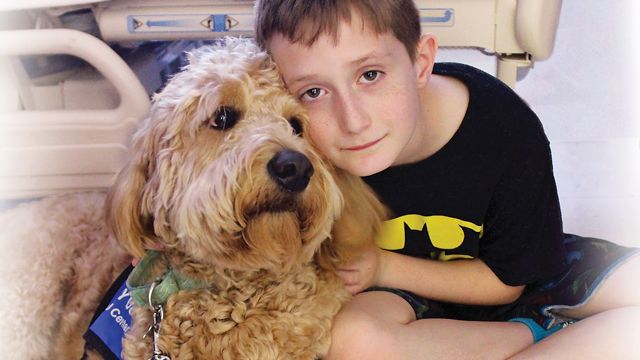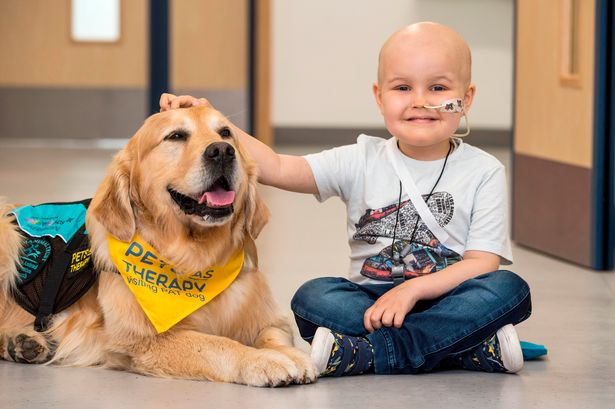
Dogs bring warmth and joy to families, but apart from being a big source of love, their presence can also be very therapeutic. In hospitals and in various facilities, dogs can do wonders for patients as they aid people who have certain medical conditions and their presence comforts people who are ill. If you’re interested in taking your well-mannered dog to visit patients, it helps if he undergoes therapy dog training. Read on to learn more about what this entails.
What Are Therapy Dogs?
What separates therapy dogs from other dogs is that they’re specifically trained to give comfort and even some medical services to people who need them. Therapy dogs are stationed in retirement homes, hospitals, nursing homes, and rehabilitation facilities most commonly. These dogs have good temperaments and they are also very sociable and confident.
Also read: Service Dog Training
Dogs posses certain gifts, and you’ve probably heard a lot of success stories about dogs that seem to have healing capacities. Therapy dogs harness this ability to make people feel happier. Dogs usually need to get certified before they can become official. There are organizations that provide training programs and conduct evaluations to verify skills. And, before a dog can be certified, there are plenty of skills he must learn. There’s also a need to evaluate you as the handler before you enter a particular level of training class. Depending on the training, dogs are taught fundamental lessons like basic obedience as well as therapy dog classes. If both you and your dog pass and get certified, your pet can then start working as a therapy dog.
Benefits
According to research, patients who are exposed to or have direct interaction with therapy dogs release oxytocin and dopamine, which are brain chemicals that can reduce stress and make people feel happier. This explains why even people who are depressed can start to improve with the help of a dog. In fact, you can even find therapy dogs at disaster sites. They are proven to have amazing therapeutic effects on people. For example, therapy dogs can be of big help to children. There are children who find it difficult to read in public and develop good self-esteem. However, they can start practicing reading in front of a dog because they don’t feel any pressure and they’re able to relax. In time, when they start to develop and build their self-confidence reading to a nice dog, they become ready to face a bigger audience.
Aside from hospitals and other facilities, therapy dogs are also found in colleges and universities. In the United States, many institutions use therapy dogs to help in de-stressing students. There are events, such as “Therapy Fluffies,” wherein handlers bring therapy dogs around the school, and students get a chance to play and interact with them during finals week.
How Do Therapy Dogs Serve?

When you think of therapy dogs, the very first things that come to mind are usually hospitals and nursing homes. The dogs are most commonly found in these facilities. But how do they get to serve people? If you have a therapy dog and you want to help volunteer, you need to contact a therapy organization so you can make the necessary arrangements. Your organization will act as the coordinator when it comes to the activities that you want to participate in.
Of course, before you can arrange a trip, the organization will want to verify that your dog has had the proper training. Training courses take about six months and utilize different methods like positive reinforcement and reward-based skills. These methods are widely used to train dogs because they’re highly effective.
So, what’s included in training courses for therapy dogs? This may differ depending on the institution providing the training program. Dogs will undergo different levels of training. At the beginning, your dog is trained to learn basic obedience, control, and relaxation. In addition to basic obedience, both you and your pet undergo socialization exercises to ensure the dog remains calm around sensitive populations.
Finally, there is therapy-skills training. In this, dogs and handlers learn greeting exercises, hospital-environment roleplaying, the right way to handle dogs, and more. Your dog may also shadow a certified therapy dog for a day to see how he performs. Because therapy dogs work with patients and other professionals, they should be able to socialize and work well with unfamiliar people. They should not be easily frightened by noises and devices. After training is complete, your dog must pass a skills test through a certification board for therapy animals.
Types of Therapy Dogs
There are various types of therapy dogs used in different facilities. The first type is known as the Therapeutic Visitation Animal. They are the most common therapy dogs. Most of them come from families who want to share the joy of animal companionship with other people. They go to places like nursing homes, hospitals, and retirement homes, and they don’t always have to be certified. These therapy dogs can do a lot of amazing things to improve the condition and lift the spirit of a person who’s feeling down.
Another type of therapy dog is known as the Assisted Therapy Animal. These dogs are trained to help occupational therapists with physical rehabilitation. They can help a patient during his or her recovery program by encouraging him or her to improve balance, range of motion, and more.
The last type is the Facility Therapy Animal. These dogs are employed in nursing homes, psychiatric facilities, and long-term care facilities. They work alongside healthcare providers as they provide for patients.
Testing and Certification
Therapy dogs need to be certified, and there are various organizations offering this testing. In the United States, Therapy Dogs International offers certification. Organizations usually require dogs to prove their training by performing certain skills. The dogs can also earn the title of Canine Good Citizen, which certifies that they are trained in basic obedience, proper behaviour, and good manners. Many dogs can learn to provide therapeutic benefits for people, and if yours is friendly and mild-mannered, you both might find a lot of success helping people.Sharing is caring!

0 Comments